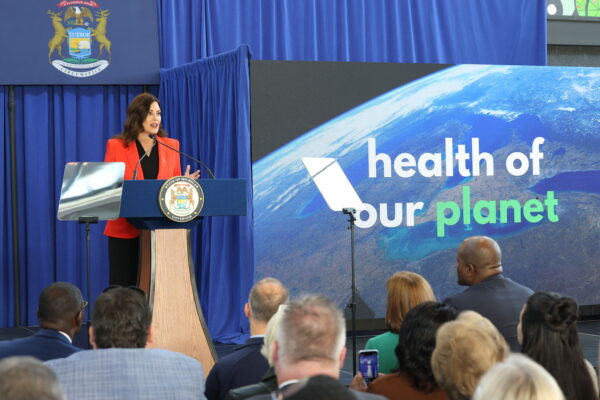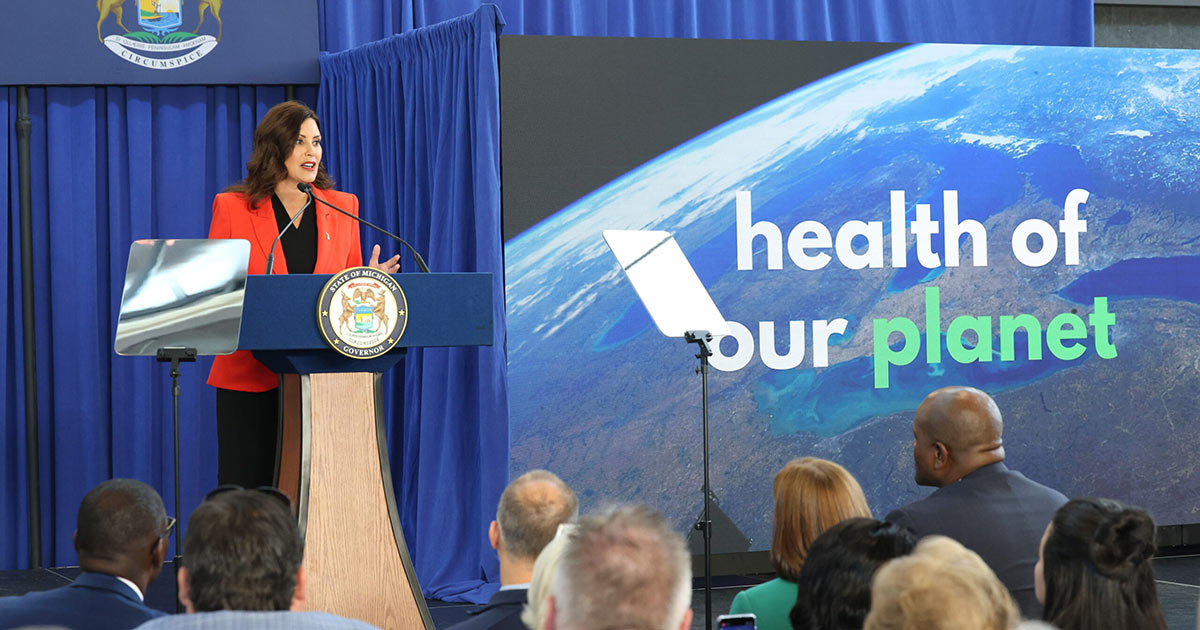Legislators prepared to meet, go beyond ‘What’s Next’ agenda
LANSING, Mich., Sept. 1, 2023 — In her “What’s Next Address” this week, Gov. Gretchen Whitmer laid out policy goals in several areas, including clean energy and environmental protection. Members of the House Democratic Caucus have already been working in these areas and are ready to push their sustainability agenda forward as legislative session resumes.

Gov. Gretchen Whitmer details her environmental priorities during the “What’s Next Address” on Wednesday, Aug. 30, 2023 in Lansing.
“Just this week, our bipartisan Energy Reliability, Resilience and Accountability Task Force held its final listening tour stop. Michiganders need and deserve a reliable energy grid and affordable electricity,” said state Rep. Helena Scott (D-Detroit), chair of the House Committee on Energy, Communications, and Technology. “After hearing residents across the state tell their stories of power outages, I’m looking forward to introducing legislation to help keep the lights on.”
One of the major points in Whitmer’s address was permitting, specifically of new renewable energy projects. House Democrats are currently crafting legislation to help the Michigan Public Service Commission (MPSC), the state’s utility regulator, streamline the approval of renewable energy facilities.
“More and more states are adopting renewable energy standards, and that means competition for site selection and job creation will be fierce,” said state Rep. Phil Skaggs (D-East Grand Rapids). “Michigan needs to act quickly and decisively, giving the MPSC the authority it needs to approve large-scale renewable energy projects to create jobs here in Michigan and meet our renewable goals.”
Earlier this year, Democratic legislators partnered with environmental advocates to introduce a package of bills designed to accelerate clean energy growth, reduce energy waste and create jobs. These bills are firmly within Whitmer’s calls for a 100% carbon-free energy standard and increasing energy efficiency projects.
“From day one, I’ve made it a priority to fight for environmental and economic justice, both for my constituents and folks across the state of Michigan. I’m proud to stand with my colleagues in leading on this issue and receiving the governor’s support,” said House Majority Floor Leader Abraham Aiyash (D-Hamtramck). “Our legislation will create a standard for renewable energy siting and job creation, and will ensure that low-income communities and communities of color are not forgotten when utilities are ramping up their energy efficiency programs. When we work from the bottom up, everyone benefits.”
Another piece of legislation already introduced this term would allow for the creation of community solar facilities. These are small- to medium-scale projects that allow individuals, businesses and communities to generate more renewable energy and lessen reliance on the existing grid.
“Getting Michigan to 100% carbon-free energy is going to take efforts of every size and scale — from utilities shutting down coal plants and investing in clean energy to local and individual solar projects powering homes and businesses,” said state Rep. Rachel Hood (D-Grand Rapids), sponsor of the community solar bill. “I look forward to community solar being part of the solution as Michigan takes its rightful place as a national leader in decarbonizing our electric grid.”
Finally, a policy that Democrats will continue pursuing after years of advocacy is so-called “polluter pay” legislation. Introduced last term as House Bill 4314 of 2021, the bill required corporations to clean up pollution they caused unless the cleanup was technically infeasible.
“It’s pretty simple — if you make a mess, you clean it up. It applies whether you’re a kid with a messy room or a corporation that dumps toxic material into our waterways,” said state Rep. Jason Morgan (D-Ann Arbor). “My community has dealt with this issue, and I wouldn’t wish it on any other. We need to hold corporate polluters accountable to ensure that our air, land and water remain safe, clean and healthy.”

